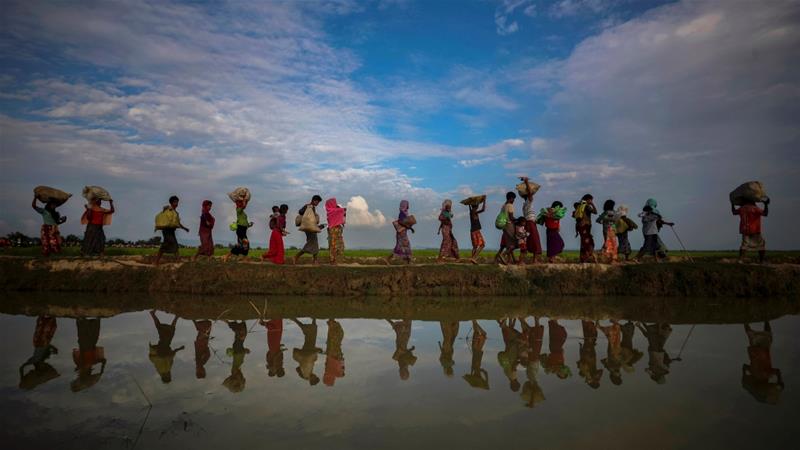Inaction on China and India’s Crimes Emboldens Myanmar
TRANSCEND MEMBERS, ASIA-UPDATES ON MYANMAR ROHINGYA GENOCIDE, 2 Sep 2019
How can Myanmar reverse its anti-Rohingya policies if it has China and India as an example?

Rohingya refugees flee from Myanmar into Palang Khali, near Cox’s Bazar, Bangladesh on November 2, 2017. [Reuters/Hannah McKay]
25 Aug 2019 – Today, Rohingya refugees and survivors in refugee camps, as well as their diasporic communities, commemorate the second Rohingya Genocide Memorial Day. On this day two years ago, a new campaign of genocidal violence was launched by the Myanmar military against the Rohingya.
In recent months, small steps have been made to hold those responsible for this tragedy to account. The Prosecutor’s Office at the International Criminal Court is said to be determined to open a full investigation into crimes against the Rohingya including, but not limited to, the deportation of close to 750,000 Rohingya in 2016-2017.
The UN General Assembly has authorised the establishment of the International Independent Mechanism with a budget of $28m in order to collect evidence of Myanmar’s atrocities against the Rohingya and other persecuted minorities for potential use in any future tribunals.
Additionally, there have been serious calls for mounting a legal challenge against Myanmar at the International Court of Justice for failing to honour its obligations under the Genocide Convention.
While these steps are a welcome development, the so-called “international community” continues to fail to protect the rights of the Rohingya and provide them with safety and dignified living conditions. Those who remain in Myanmar continue to be confined to camps and face effectively an apartheid regime which refuses to grant them their rights as citizens. Those in refugee camps in Bangladesh and elsewhere still live in horrendous conditions and continue to face the threat of forced repatriation.
The international community has also failed to take the necessary measures to punish and isolate the Myanmar regime for its atrocities. Except for a few travel bans and limited sanctions, there has been no serious action against those in power in Naypyidaw. Increasingly, one of the main causes of this lack of action has been the rise of anti-Muslim sentiment across the world.
Europe is currently struggling with the growing influence of the far right and its anti-Muslim agenda. The United States is led by an administration which has openly expressed Islamophobic views and implemented anti-Muslim policies, such as the Muslim travel ban. In Asia, the Association of Southeast Asian Nations (ASEAN) has also struggled to take action, while two regional powers – China under assertive Xi Jinping and India under Narendra Modi‘s far-right Hindu nationalist party – have openly victimised their Muslim populations.
While serving as Myanmar’s most important and powerful protector within the UN system, particularly the Security Council, China is, without a doubt, committing crimes against humanity against several million ethnic Uighurs.
Beijing’s acts of rounding up a substantial segment of Uighurs and putting them in what the communist authorities euphemistically and variously term “vocational training schools” or “re-education camps” are also indicative of a mounting genocide. Beijing has also imposed various restrictions on the use of the Uighur language and has started razing monuments of the Uighur culture and religious buildings; it also recently banned the use of Muslim and Arabic symbols across the country.
China has responded to criticism with denial and has employed its international influence to push Muslim-majority countries to back its campaign of human rights abuses against the Uighur people.
Similarly, India has become stridently anti-Muslim in recent years under the rule of the Bharatiya Janata Party (BJP). New Delhi’s Home Affairs Minister Amit Shah has openly called Muslim migrants “termites” and vowed to forcibly deport any Rohingya refugees and asylum seekers back into harm’s way in Myanmar.
The ruling BJP party has promulgated and used far-right Hindu nationalism, targeting primarily Indian Muslims at home, as a way of capturing Hindu majority votes. After India’s most recent election, Modi and BJP’s powers remain completely unchecked, both domestically or globally. Two policies recently enacted speak volume about the rise of Hindu fundamentalism.
First, last year India struck off its National Register of Citizens nearly four million of its own Muslims in Assam which borders with Bangladesh, in a move reminiscent of the Nazis’ denationalisation of all naturalised Jews at the party gathering in Nuremberg in 1933.
Second, earlier this month, the Indian government stripped predominantly Muslim Kashmir of its special political status and put the disputed region under martial law-like conditions. Telecommunications have been cut off and protests against the decision are being brutally put down.
The international response to these brutal actions has also been rather muted, whether in the West or the East.
This cannot but embolden the Myanmar regime and cause despair among Rohingya that there will ever be enough international pressure to hold their abusers to account and ensure their safe return home. India’s decision to strike off Muslims from the national register and China’s campaign of locking over a million Uighurs in interment camps serve as a powerful example for Myanmar’s leadership that international law is something to discard and global public opinions do not matter.
But all is not lost.
When the international community fails yet again to make “Never again!” the moral and intellectual basis of its policies towards international criminal regimes, it becomes incumbent upon us, the people of the world, to come together and act.
On August 25, the Free Rohingya Coalition is co-hosting an international conference on Myanmar’s ongoing victimisation of the Rohingya at Sogang University in Seoul. Activists and engaged legal and genocide scholars from 12 countries are set to explore various ways to end the genocide including a new grassroots movement modelled after the anti-apartheid boycott of South Africa – not only in terms of trade, but also in terms of culture, sports, and institutions.
In times when rational analysis only gives a bleak prognosis for the wretched of the earth, Rohingya refugees and activists are taking to heart the memorable maxim gifted by the late Italian labour organiser Antonio Gramsci: “Pessimism of the intellect, optimism of the heart”. We, the people, can make change that governments fail or refuse to undertake.
___________________________________________
 A Buddhist humanist from Burma, Maung Zarni is a member of the TRANSCEND Network for Peace Development Environment, former Visiting Lecturer with Harvard Medical School, specializing in racism and violence in Burma and Sri Lanka, and Non-resident Scholar in Genocide Studies with Documentation Center – Cambodia. Zarni is coordinator for Strategic Affairs for Free Rohingya Coalition and an adviser to the European Centre for the Study of Extremism, Cambridge, UK. His analyses have appeared in leading newspapers including the New York Times, The Guardian and the Times. Among his academic publications on Rohingya genocide are The Slow-Burning Genocide of Myanmar’s Rohingyas (Pacific Rim Law and Policy Journal), An Evolution of Rohingya Persecution in Myanmar: From Strategic Embrace to Genocide, (Middle East Institute, American University), and Myanmar’s State-directed Persecution of Rohingyas and Other Muslims (Brown World Affairs Journal). He co-authored, with Natalie Brinham, Essays on Myanmar Genocide. Zarni holds a PhD (U Wisconsin at Madison) and a MA (U California), and has held various teaching, research and visiting fellowships at the universities in Asia, Europe and USA including Oxford, LSE, UCL Institute of Education) , National-Louis, Malaya, and Brunei. He is the recipient of the “Cultivation of Harmony” award from the Parliament of the World’s Religions (2015).
A Buddhist humanist from Burma, Maung Zarni is a member of the TRANSCEND Network for Peace Development Environment, former Visiting Lecturer with Harvard Medical School, specializing in racism and violence in Burma and Sri Lanka, and Non-resident Scholar in Genocide Studies with Documentation Center – Cambodia. Zarni is coordinator for Strategic Affairs for Free Rohingya Coalition and an adviser to the European Centre for the Study of Extremism, Cambridge, UK. His analyses have appeared in leading newspapers including the New York Times, The Guardian and the Times. Among his academic publications on Rohingya genocide are The Slow-Burning Genocide of Myanmar’s Rohingyas (Pacific Rim Law and Policy Journal), An Evolution of Rohingya Persecution in Myanmar: From Strategic Embrace to Genocide, (Middle East Institute, American University), and Myanmar’s State-directed Persecution of Rohingyas and Other Muslims (Brown World Affairs Journal). He co-authored, with Natalie Brinham, Essays on Myanmar Genocide. Zarni holds a PhD (U Wisconsin at Madison) and a MA (U California), and has held various teaching, research and visiting fellowships at the universities in Asia, Europe and USA including Oxford, LSE, UCL Institute of Education) , National-Louis, Malaya, and Brunei. He is the recipient of the “Cultivation of Harmony” award from the Parliament of the World’s Religions (2015).
Go to Original – aljazeera.com
Tags: Activism, Asia, Asia and the Pacific, Buddhism, Burma/Myanmar, Conflict, Ethnic Cleansing, Genocide, Geopolitics, History, Human Rights, Humanitarianism, Indigenous Rights, Justice, Military, Power, Racism, Religion, Rohingya, Social justice, Solutions, United Nations, Violence, Violent conflict, War
DISCLAIMER: The statements, views and opinions expressed in pieces republished here are solely those of the authors and do not necessarily represent those of TMS. In accordance with title 17 U.S.C. section 107, this material is distributed without profit to those who have expressed a prior interest in receiving the included information for research and educational purposes. TMS has no affiliation whatsoever with the originator of this article nor is TMS endorsed or sponsored by the originator. “GO TO ORIGINAL” links are provided as a convenience to our readers and allow for verification of authenticity. However, as originating pages are often updated by their originating host sites, the versions posted may not match the versions our readers view when clicking the “GO TO ORIGINAL” links. This site contains copyrighted material the use of which has not always been specifically authorized by the copyright owner. We are making such material available in our efforts to advance understanding of environmental, political, human rights, economic, democracy, scientific, and social justice issues, etc. We believe this constitutes a ‘fair use’ of any such copyrighted material as provided for in section 107 of the US Copyright Law. In accordance with Title 17 U.S.C. Section 107, the material on this site is distributed without profit to those who have expressed a prior interest in receiving the included information for research and educational purposes. For more information go to: http://www.law.cornell.edu/uscode/17/107.shtml. If you wish to use copyrighted material from this site for purposes of your own that go beyond ‘fair use’, you must obtain permission from the copyright owner.
Read more
Click here to go to the current weekly digest or pick another article:
TRANSCEND MEMBERS:
- Enabling Collective Lunacy by Remaking the Universe in One's Image
- Shaming the UN by Ratifying Genocide
- Call Me "an Antisemite"
ASIA-UPDATES ON MYANMAR ROHINGYA GENOCIDE: